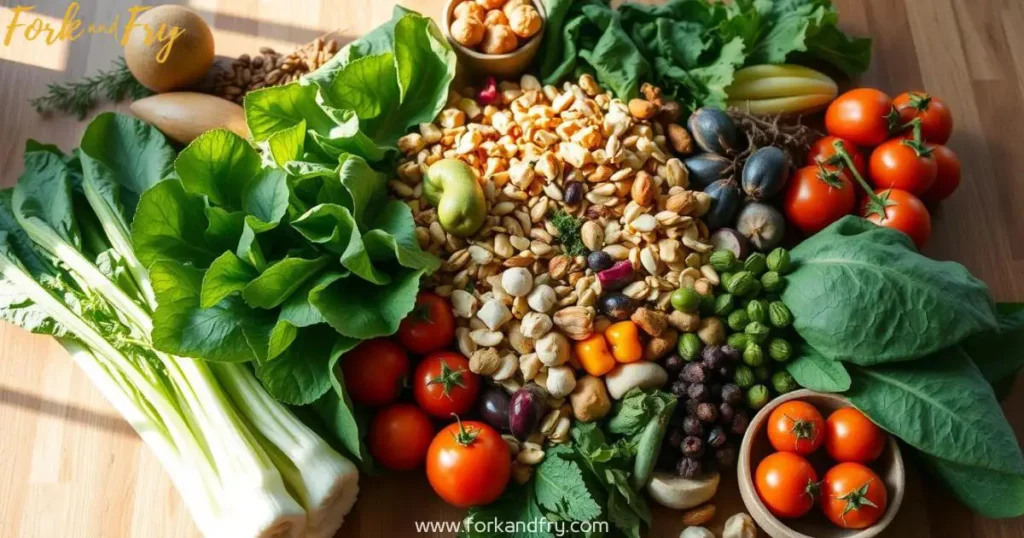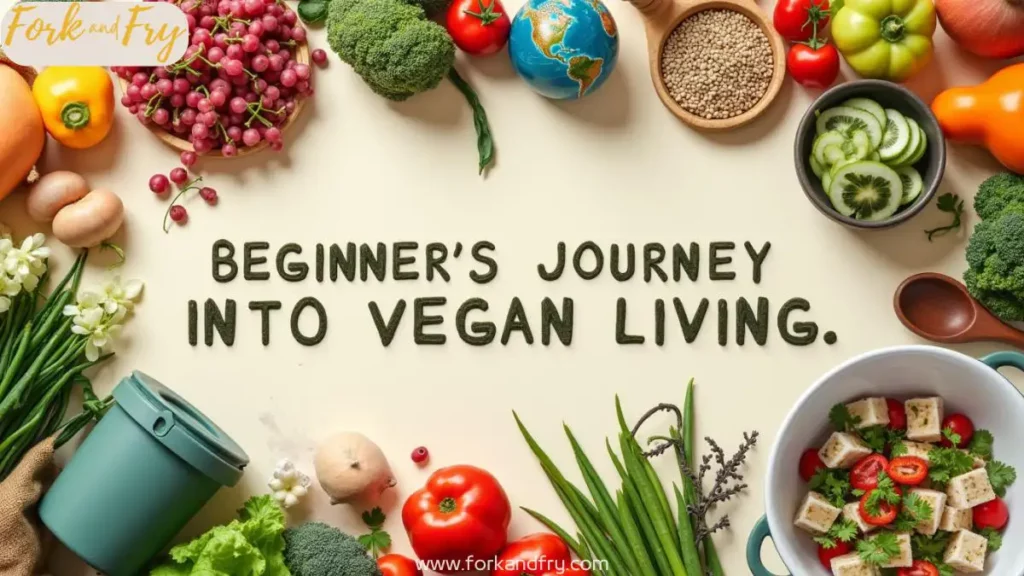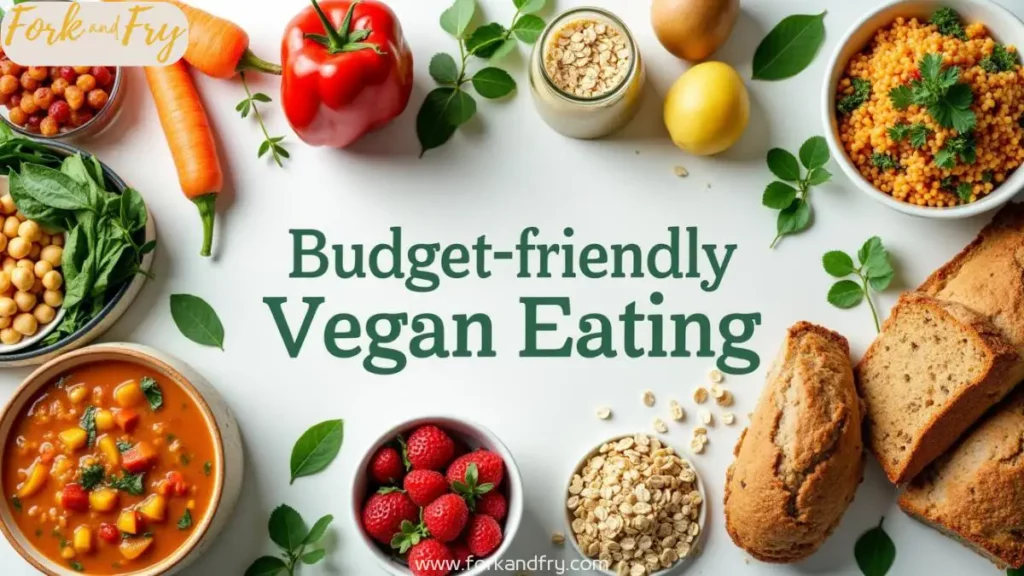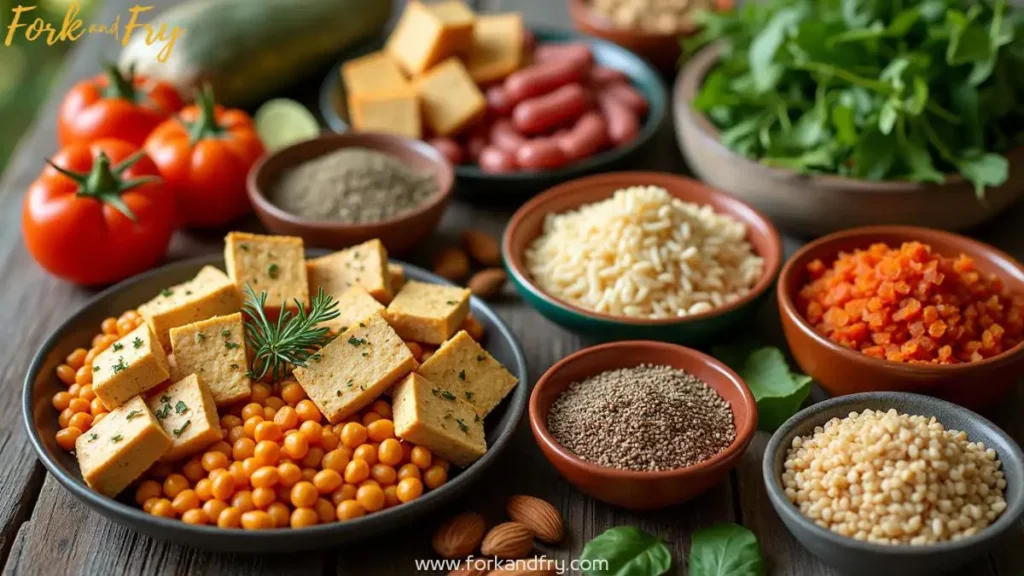Last updated on February 22nd, 2025 at 06:40 pm
Table of Contents
The Podcast
Listen to the Podcast

October 6, 2024 · Season 2 : Chop and Pop · Episode 10
Going Green: A Beginner's Guide to Vegan Living
12 Min · By Sorrel Calver
Ready to live more sustainably? Our beginner's guide to vegan living covers everything you need to start your "going green" journey.
Welcome to the world of going green and embracing eco-friendly practices! I’ve been vegan for over 7 years. It’s a rewarding journey that changes how you see food and live. By choosing vegan, you help the planet and live more sustainably.
Starting your vegan journey means no animal products, like dairy, eggs, and honey. You’ll find new foods, read labels, and make smart choices. You’re joining a big group that loves the planet and healthy living.

Key Takeaways
- Going green and embracing eco-friendly practices can have a significant impact on the environment and your health.
- A vegan lifestyle involves abstaining from the consumption of animal products, including meat, dairy, eggs, and honey.
- By choosing a vegan lifestyle, you’re taking a significant step towards reducing your carbon footprint and promoting sustainable living.
- With careful planning, a vegan diet can provide all the necessary nutrients, including protein, iron, and B12.
- Joining vegan groups and seeking advice from experienced vegans can make the transition to a vegan lifestyle easier and more enjoyable.
- Embracing sustainable living and going green can lead to a healthier lifestyle and a more environmentally conscious way of living.
- Veganism can lead to a healthier lifestyle when based on whole, plant-based foods, and may reduce the risk of cognitive health issues by as much as 33%.
Understanding the Foundations of Going Green Through Veganism
Exploring veganism shows how animal agriculture harms the environment. It leads to deforestation, water pollution, and greenhouse gas emissions. Choosing veganism improves your health and helps the planet, reducing our carbon footprint.
A vegan diet cuts down greenhouse gas emissions. Studies say veganism could lower food-related deaths by 10% and emissions by 70% by 2050. This is because animal farming, like beef production, is a big emitter. In contrast, beans and lentils have a lower carbon footprint, aiding in renewable energy and reducing carbon footprint.
- Reducing greenhouse gas emissions by choosing plant-based foods
- Conserving water and land by avoiding animal agriculture
- Promoting renewable energy by supporting sustainable farming practices

Adopting veganism is a big step towards a greener future. It helps in environmental conservation. So, why not start today and help the planet?
Essential First Steps for New Vegans
Starting your vegan journey is exciting. Begin by slowly removing animal products from your diet. Try new plant-based foods like almond milk instead of cow’s milk. Every small change helps, and being patient with yourself is key.
Being vegan is more than just food. It’s about living an eco-conscious lifestyle and supporting green initiatives. Look for vegan communities online for recipes and support. Connecting with others can make the transition smoother.
Here are some tips for new vegans:
- Start with one vegan meal a day or remove meat or dairy one day a week
- Explore different types of plant-based milk and find one that you enjoy
- Try new vegan recipes and flavors to keep your diet interesting
By taking these steps, you’re on your way to a vegan lifestyle. Remember, it’s a journey, not a destination. Enjoy the journey and treat yourself with kindness.

Plant-Based Nutrition Basics
Starting your journey to sustainable living means learning about plant-based nutrition. A good plant-based diet gives you all the nutrients you need for health. It also helps the environment, thanks to eco-friendly practices.
Legumes, beans, and tofu are great for protein. Adults require approximately 50 grams of protein per day. Plant-based foods make it easy to get this amount. Also, vitamins like B12 and iron are key for health.

Planning your meals is key to a successful plant-based diet. Eat a mix of whole grains, fruits, and veggies for all nutrients. Here are a few meal planning tips:
- Prioritize whole grains over refined ones.
- Make sure to eat a variety of colorful fruits and veggies.
- Enhance flavors with herbs and spices instead of relying on salt and sugar.
By adopting these habits and embracing sustainable living, you can maintain a nutritious plant-based diet that benefits both you and the environment.
Transforming Your Kitchen for Vegan Success
Transitioning to a vegan lifestyle starts with transforming your kitchen. This involves removing non-vegan foods and restocking with plant-based alternatives.. A tidy kitchen helps you make healthy, plant-based meals easily.
Here are some helpful tips to begin your journey:
- Clear out expired and non-vegan food items from your pantry and fridge.
- Restock with whole, plant-based foods, such as fruits, vegetables, and whole grains.
- Invest in essential kitchen tools, like a good chef’s knife and a cast-iron skillet.
These green initiatives will help you create a kitchen that inspires you. Keep it organized to find what you need quickly. This makes cooking delicious, vegan meals easier.

With a bit of planning and creativity, your kitchen can become a vegan cooking haven. It supports your eco-conscious lifestyle and helps you live healthier and more sustainably.
Navigating Social Situations as a New Vegan
Starting your vegan journey can lead to tricky social situations. Whether it’s eating out with friends or going to family events, being ready and sure of your choices is key. By talking openly with your loved ones about being vegan, you help the planet and support environmental conservation.
To handle social situations as a new vegan, plan ahead, take action, and talk clearly with others. Look for supportive groups and online tools to keep you inspired. Every choice you make can help the environment and improve your health.
Here are some tips for handling social situations as a new vegan:
- Plan ahead: Look up vegan-friendly places and menus before going out with friends.
- Be proactive: Bring a vegan dish to share at gatherings.
- Communicate effectively: Explain your vegan choices clearly and kindly.
By using these tips and being thoughtful about your choices, you can confidently handle social situations. Remember, every little bit helps, and together we can make the world a better place.
Sustainable Shopping and Eco-Friendly Products
As you work towards a greener lifestyle, choosing sustainable shopping is key. This means reading labels and ingredients, picking cruelty-free personal care, and opting for sustainable fashion. These actions help reduce your environmental impact and support eco-friendly practices and sustainable living.
For sustainable shopping, buy local products to cut down on transportation energy. Choose items made from durable, high-quality materials. Also, look for products with little packaging or those made from recycled materials. Remember, the cost of cleaning up oil spills is about $16 per gallon. So, pick products that are locally sourced and eco-friendly.
Here are some eco-friendly product examples:
- Reusable shopping bags, such as Baggu Standard Reusable Shopping Bags
- Refillable cleaning products, like Seventh Generation Free & Clear Liquid Dish Soap
- Sustainable fashion choices, such as Patagonia Women’s Downdrift Jacket
By choosing these sustainable options, you help reduce waste, energy use, and resource depletion. Every small change you make can make a big difference when many people do the same. So, embrace eco-friendly practices daily and support sustainable living for a brighter future.
Common Challenges and Solutions in Vegan Living
Starting your vegan journey can be tough. You might feel cravings, face social pressure, or worry about not getting enough nutrients. But, with the right mindset and support, you can beat these challenges and do well on a plant-based diet. Choosing locally sourced, seasonal produce can also help cut down on emissions from transportation.
It’s important to be kind to yourself and celebrate your small wins. Finding a supportive community, online or in-person, is key. This way, you can stay motivated and inspired. Joining green initiatives and connecting with others who share your values helps you stay on track and make a difference.
Here are some tips for a successful vegan lifestyle:
- Plan your meals ahead to make sure you get all the nutrients you need.
- Try new recipes and flavors to keep your diet exciting and varied.
- Drink plenty of water and listen to what your body tells you.
By following these tips and staying true to your goals, you can help reduce your carbon footprint. Every small choice you make can add up and make a big difference for the planet.
Beyond Diet: Expanding Your Green Lifestyle
As you move towards a greener lifestyle, it’s key to look beyond just your diet. You should aim for an eco-conscious lifestyle that includes caring for the environment in all you do. Simple changes can greatly reduce your impact on Earth and help create a better future.
Start by cutting down on household waste. You can do this by recycling, composting, and avoiding plastics that are used once and then thrown away. Also, choose to use public transport, walk, or bike when you can. Turning off lights and electronics when not needed also helps a lot.
By adding these habits to your daily routine, you’ll help the environment and live a healthier life. These small steps can have big effects on your health and the planet. So, begin making these changes today and see the good it does for you and the world.
| Tip | Description |
|---|---|
| Reduce household waste | Recycle, compost, and avoid single-use plastics |
| Make sustainable transportation choices | Use public transportation, walk, or bike whenever possible |
| Conserve energy | Turn off lights and electronics when not in use |
Final Thoughts: Committing to a More Sustainable Future
As you finish our guide to going green through sustainable living, remember every small step counts. Choosing a vegan diet is a significant step toward lowering your environmental footprint, but there are plenty of other ways to incorporate sustainability into your daily life.
Try using public transport or biking instead of driving. Opt for energy-efficient appliances and minimize household waste to help protect the environment while also reducing your utility costs. Plus, you’ll breathe cleaner air and feel more connected to your community.
This journey is about making progress, not being perfect. Be gentle with yourself, celebrate your wins, and don’t get down about mistakes. Keep moving forward, and you’ll grow and succeed on your way to a greener future. Share your journey, meet others who care, and encourage them to join you in making our world more sustainable.
FAQ
What is a vegan lifestyle?
A vegan lifestyle means not eating animal products like meat, dairy, eggs, and honey. You’ll look for new plant-based foods, read labels, and choose products wisely.
What is the environmental impact of animal agriculture?
Animal farming leads to deforestation, water pollution, and greenhouse gases. By going vegan, you help the planet and reduce your carbon footprint.
What are the potential health benefits of following a vegan diet?
Being vegan can lower heart disease risk and boost overall health.
How do I get started on a vegan journey?
Start by slowly removing animal products and adding plant-based foods. Every change helps. Be patient and kind to yourself as you explore this new path.
What are the key protein sources in a vegan diet?
Legumes, beans, and tofu are key protein sources for vegans.
How do I ensure I’m getting essential vitamins and minerals on a vegan diet?
Make sure to get vitamins like B12 and minerals like iron. Good meal planning is key to getting all the nutrients you need.
How do I transform my kitchen to support a vegan lifestyle?
To veganize your kitchen, clear out old items and restock with vegan-friendly foods. Create a space that encourages you to try new recipes.
How do I navigate social situations as a new vegan?
It can be tough, but being open and honest with others helps. Look for supportive communities and online resources.
What are some sustainable shopping choices for vegans?
Choose products with care, read labels, and pick cruelty-free personal care items. Also, make eco-friendly fashion choices.
What challenges do new vegans commonly encounter?
New vegans might face cravings, social pressure, or nutritional issues. But, finding support and being patient can help.
How can I expand my green lifestyle beyond my diet?
Expand your green lifestyle by reducing waste, choosing eco-friendly transport, and saving energy at home.






